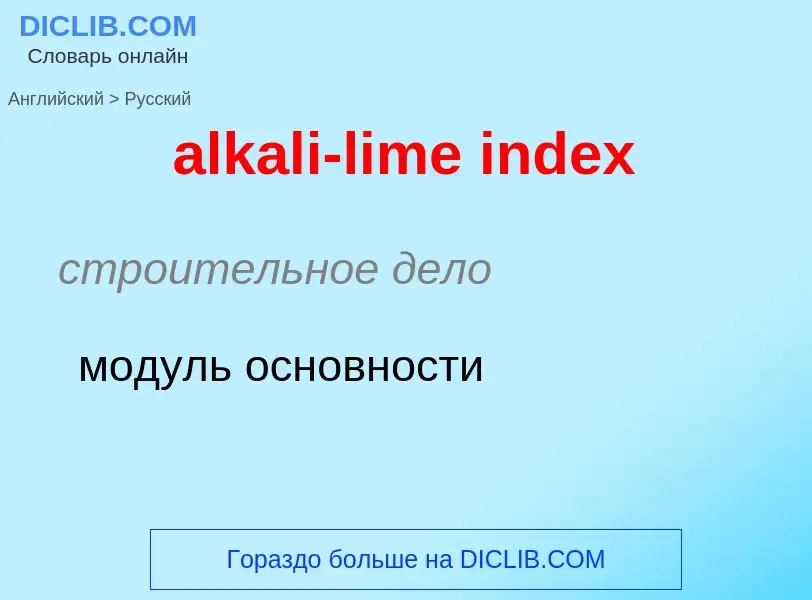Traduction et analyse de mots par intelligence artificielle ChatGPT
Sur cette page, vous pouvez obtenir une analyse détaillée d'un mot ou d'une phrase, réalisée à l'aide de la meilleure technologie d'intelligence artificielle à ce jour:
- comment le mot est utilisé
- fréquence d'utilisation
- il est utilisé plus souvent dans le discours oral ou écrit
- options de traduction de mots
- exemples d'utilisation (plusieurs phrases avec traduction)
- étymologie
alkali-lime index - traduction vers russe
строительное дело
модуль основности
общая лексика
щелочной металл
Définition
Wikipédia

The alkali–silica reaction (ASR), more commonly known as concrete cancer, is a deleterious swelling reaction that occurs over time in concrete between the highly alkaline cement paste and the reactive amorphous (i.e., non-crystalline) silica found in many common aggregates, given sufficient moisture.
This deleterious chemical reaction causes the expansion of the altered aggregate by the formation of a soluble and viscous gel of sodium silicate (Na2SiO3 · n H2O, also noted Na2H2SiO4 · n H2O, or N-S-H (sodium silicate hydrate), depending on the adopted convention). This hygroscopic gel swells and increases in volume when absorbing water: it exerts an expansive pressure inside the siliceous aggregate, causing spalling and loss of strength of the concrete, finally leading to its failure.
ASR can lead to serious cracking in concrete, resulting in critical structural problems that can even force the demolition of a particular structure. The expansion of concrete through reaction between cement and aggregates was first studied by Thomas E. Stanton in California during the 1930s with his founding publication in 1940.


![Surface of a concrete pillar of the building of the [[National Gallery of Canada]] at [[Ottawa]] presenting the typical crack pattern of the alkali-silica reaction (ASR). Note the typical fatty aspect of the yellow silicagel exudations imbibing the concrete surface along the two sides of the cracks. Surface of a concrete pillar of the building of the [[National Gallery of Canada]] at [[Ottawa]] presenting the typical crack pattern of the alkali-silica reaction (ASR). Note the typical fatty aspect of the yellow silicagel exudations imbibing the concrete surface along the two sides of the cracks.](https://commons.wikimedia.org/wiki/Special:FilePath/ASR concrete pillar National Gallery of Canada 01.jpg?width=200)


![Anhydrous and hydrated silica surface with [[siloxane]] and [[silanol]] groups along with surface bound water molecules. Anhydrous and hydrated silica surface with [[siloxane]] and [[silanol]] groups along with surface bound water molecules.](https://commons.wikimedia.org/wiki/Special:FilePath/Schematic silica gel surface.png?width=200)
![Chemical structure of a [[silanol]] group. Chemical structure of a [[silanol]] group.](https://commons.wikimedia.org/wiki/Special:FilePath/Silanol group.png?width=200)




![A wheel type radiotherapy device which has a long [[collimator]] to focus the radiation into a narrow beam. The caesium-137 chloride radioactive source is the blue square, and gamma rays are represented by the beam emerging from the aperture. This was the radiation source involved in the Goiânia accident, containing about 93 grams of caesium-137 chloride. A wheel type radiotherapy device which has a long [[collimator]] to focus the radiation into a narrow beam. The caesium-137 chloride radioactive source is the blue square, and gamma rays are represented by the beam emerging from the aperture. This was the radiation source involved in the Goiânia accident, containing about 93 grams of caesium-137 chloride.](https://commons.wikimedia.org/wiki/Special:FilePath/GoiâniaRadiationsource.gif?width=200)
![Similarly to the alkali metals, [[ammonia]] reacts with [[hydrochloric acid]] to form the salt [[ammonium chloride]]. Similarly to the alkali metals, [[ammonia]] reacts with [[hydrochloric acid]] to form the salt [[ammonium chloride]].](https://commons.wikimedia.org/wiki/Special:FilePath/Hydrochloric acid ammonia.jpg?width=200)
![[[Johann Wolfgang Döbereiner]] was among the first to notice similarities between what are now known as the alkali metals. [[Johann Wolfgang Döbereiner]] was among the first to notice similarities between what are now known as the alkali metals.](https://commons.wikimedia.org/wiki/Special:FilePath/Johann Wolfgang Döbereiner.jpg?width=200)
![pounds]] (≈ 1.4 kg) of sodium with water pounds]] (≈ 1.4 kg) of sodium with water](https://commons.wikimedia.org/wiki/Special:FilePath/Large Sodium Explosion.jpg?width=200)
![[[Lepidolite]], the rubidium mineral from which rubidium was first isolated [[Lepidolite]], the rubidium mineral from which rubidium was first isolated](https://commons.wikimedia.org/wiki/Special:FilePath/Lepidolite-76774.jpg?width=200)

![[[Lithium carbonate]] [[Lithium carbonate]]](https://commons.wikimedia.org/wiki/Special:FilePath/Lithium carbonate.jpg?width=200)
![[[Dmitri Mendeleev]]'s periodic system proposed in 1871 showing hydrogen and the alkali metals as part of his group I, along with copper, silver, and gold [[Dmitri Mendeleev]]'s periodic system proposed in 1871 showing hydrogen and the alkali metals as part of his group I, along with copper, silver, and gold](https://commons.wikimedia.org/wiki/Special:FilePath/Mendelejevs periodiska system 1871.png?width=200)


![sixth period]] sixth period]]](https://commons.wikimedia.org/wiki/Special:FilePath/Periodic variation of Pauling electronegativities.png?width=200)
![[[Petalite]], the lithium mineral from which lithium was first isolated [[Petalite]], the lithium mineral from which lithium was first isolated](https://commons.wikimedia.org/wiki/Special:FilePath/Petalite.jpg?width=200)



![[[Spodumene]], an important lithium mineral [[Spodumene]], an important lithium mineral](https://commons.wikimedia.org/wiki/Special:FilePath/Spodumene-usa59abg.jpg?width=200)
![Very pure thallium pieces in a glass [[ampoule]], stored under [[argon]] gas Very pure thallium pieces in a glass [[ampoule]], stored under [[argon]] gas](https://commons.wikimedia.org/wiki/Special:FilePath/Thallium pieces in ampoule.jpg?width=200)
